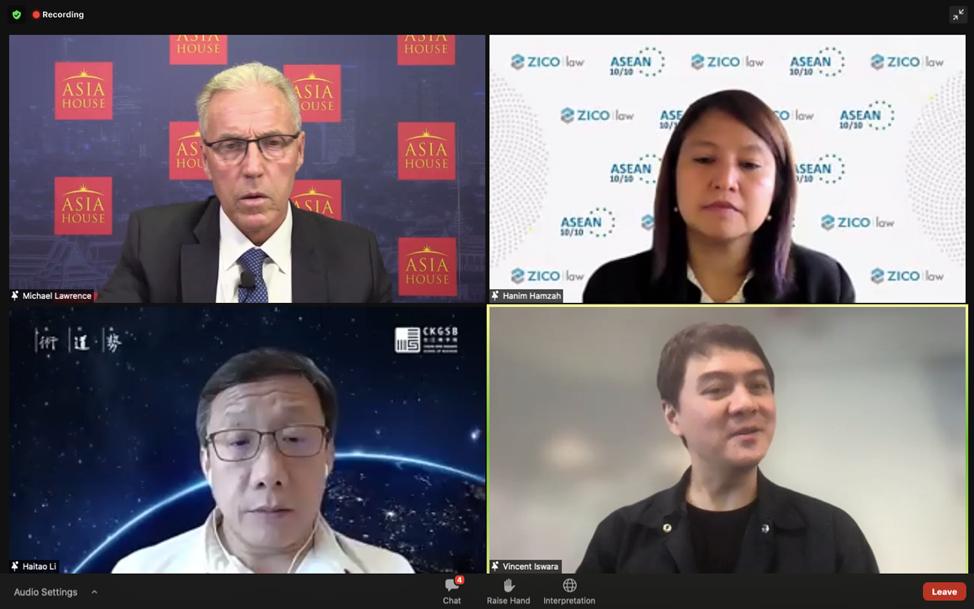[Beijing, China, June 23, 2022] Six months after the Regional Comprehensive Economic Partnership (RCEP) came into force, Cheung Kong Graduate School of Business in collaboration with Asia House, the Malaysian Chamber of Commerce in China and Indonesian Business School, Prasmul-Eli, hosted the webinar “New Frameworks: RCEP’s Critical Role in Driving the Asian Digital Economy” to discuss how the agreement will shape the future of the region, with a focus on cross-border e-commerce and data flows, digital trade, and small and medium-sized enterprises.
At the event CKGSB also launched its exclusive report: “RCEP: Can Multilateralism Lead to Economic Growth in Asia Pacific?” The report can be downloaded HERE.
The webinar was kicked off by Tran Quoc Khanh, Vietnam’s Vice Minister of Industry and Trade, who noted that “RCEP is the most comprehensive free-trade agreement (FTA) ASEAN has ever signed… The commitments on paperless trading, online protection of cross-border personal information under RCEP will contribute to a more established environment of e-commerce and regional trade in the region with ASEAN at the center, helping the business community, especially SMEs, to diversify their business activities, reduce costs and increase efficiency.”
CKGSB Founding Dean and Professor of China Business and Globalization, Xiang Bing also gave a keynote speech. He emphasized that there is already a structure in place for what is the first free trade agreement among some of Asia’s largest economies, including China. “China has been the largest trading partner of Korea for the past 18 years, Japan for 15 years, ASEAN and Australia for 13 years – so there is already very extensive integration of economies in the region. We have a great foundation for going forward.” He congratulated ASEAN for initiating RCEP and playing a critical role in completing the agreement.
Satvinder Singh, Deputy Secretary-General for ASEAN Economic Community, was also optimistic. “It is one of the most comprehensive forward looking, advanced free trade agreements that we have, not only in terms of market coverage, but in terms of the scope of issues it covers.” Despite global supply chain pressures and inflationary challenges, Singh relayed that ASEAN economies are now returning to pre-COVID 19 levels, both in terms of real growth rates and FDI.
Many of the speakers agreed that with chapters dedicated to e-commerce, intellectual property, competition and government procurement, the nature of the RCEP FTA is vastly different from other FTAs. Singh noted how this will enable the provision of technical assistance to develop countries in the region. The need to consider the different business environment and cultures of individual countries in RCEP was also a common theme in the webinar.
First Panel: “RCEP and Digital Trade”

The webinar subsequently moved on to a discussion around RCEP and the role of digital trade, which features in chapter 12 of the agreement. Hanim Hamzah, Regional Managing Partner at ZICO Law Firm, Head of the Corporate M&A Practice Group at ZICO Law Indonesia’s Roosdiono & Partners Law Firm, gave her point of view from a legal perspective, emphasizing RCEP will provide a regulatory foundation, as it mandates member countries to open up at least 65% of the services sector to ensure transparency.
Vincent Iswara, CEO of DANA in Indonesia echoed this view. “If you look at Indonesia, the transformation from a cash to a cashless economy in the past six years has been led by digital payments…and I think a lot of this is due to standardization.”
Li Haitao, Dean’s Distinguished Chair and Professor of Finance and Associate Dean at CKGSB, expanded on this, noting that private companies like Alibaba and Tencent have transformed China into a cashless society. “Looking at how private sectors operationalize digital payments will help regulators in the [RCEP] region… We can learn from companies like Alibaba and Tencent in terms of building a collective system accepted by regulators of RCEP countries,”said Li.
Hamzah agreed that due to lack of government action in enforcing rules and regulations, the private sector will play an important role. Hamzah said, “By having RCEP as an umbrella itself, it’s pivotal because there are commitments by leaders to get this done – the next stage is execution.” She noted that previously it has been the private sector that has driven the government to change the regulatory environment in the ASEAN region.
Second Panel: “RCEP’s Impact on Data Sharing and Regional Supply Chains”

The second panel gathered experts to discuss RCEP’s impact on data sharing and regional supply chains. Raymond Yee Woon Ming, Vice-President for Customs and Regulatory Affairs at DHL Express Asia Pacific, took a more pessimistic view: “A lot of the commitments in the agreement are very general. Some are declaratory, aspirational statements but there is really very little in terms of details as to exactly how this will be implemented,” he said. He noted that it uses words such as “where possible” or “best effort”. “From a business perspective, if you’re planning an investment and your regional supply chains is based on an aspirational target and on the best effort by regulators and governments – that is a massive risk from an investment perspective.”
Allan Gepty, the Philippines’ Assistant Secretary for Industry Development and Trade Policy, in response explained, “I agree that there are many provisions in the RCEP agreement where we can say they are aspirational, but it’s more of a policy direction. One thing is clear – the direction has been set, and that provides stability for our stakeholders and investors.”
David Hardoon, Chief Data and AI Officer at Union Bank of the Philippines, and Chief Data Officer at UnionDigital, argued that the agreement does allow for flexibility in addressing individual parties’ concerns and security requirements. “It is more important to be conceptual, non-prescriptive. And in fact, allowing a degree of flexibility from an implementation point-of-view.”
While speakers in the first panel were optimistic on the opportunities that RCEP presents for SMEs, Yee Woon Ming was more skeptical. He noted,“for an SME to move shipments across borders, a lot of customs issues etcetera do not distinguish between what SMEs and multinationals will trade. Multinationals have the ability to invest; they have the resources in order to plan and deal with governments. SMEs unfortunately do not have that capability and we have yet to see provisions in RCEP that actually allow and recognize that for SMEs.”
The Regional Comprehensive Economic Partnership (RCEP) came into force in January 2022. It is set to dictate the future of the economic and political landscape in Asia, being the world’s largest trade agreement and accounting for 30% of global GDP. Insightful and timely webinars such as these offer experts a chance to share their perspectives and offer the wider business community valuable analysis.